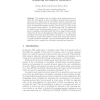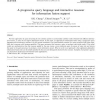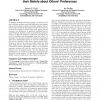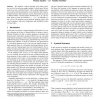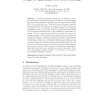153
click to vote
JAIR
2012
13 years 4 months ago
2012
To achieve scalability of query answering, the developers of Semantic Web applications are often forced to use incomplete OWL 2 reasoners, which fail to derive all answers for at ...
121
click to vote
DLOG
2011
14 years 5 months ago
2011
In this paper, we present a reasoner capable of epistemic inferences in SROIQ knowledge bases. We first identify some counter intuitive effects of imposing the traditional semant...
139
click to vote
DLOG
2011
14 years 5 months ago
2011
Abstract. The pressing need for scalable query answering has motivated the development of many incomplete ontology-based reasoners. Improving the completeness of such systems witho...
INFFUS
2007
15 years 1 months ago
2007
Previous approaches in query processing do not consider queries to automatically combine results obtained from different information sources, i.e. they do not support information...
115
click to vote
AAAI
2008
15 years 3 months ago
2008
Traditionally, only “individual-independent” facts are inputted to a reasoner. The reasoner will produce the same answer to the same question, regardless of who the questioner...
124
click to vote
ATAL
2008
Springer
15 years 4 months ago
2008
Springer
In strategic multiagent decision making, it is often the case that a strategic reasoner must hold beliefs about other agents and use these beliefs to inform its decision making. T...
101
click to vote
ECAI
2006
Springer
15 years 5 months ago
2006
Springer
Abstract. We introduce a logical language with nullary operators min(n), for each non-negative integer n, which mean `the reasoner has at least n different beliefs'. The resul...
127
click to vote
PRICAI
1998
Springer
15 years 6 months ago
1998
Springer
Weaddress the general problemof finding algorithms for efficient, qualitative, point-basedtemporalreasoning over a set of operations. Weconsider general reasonerstailored for temp...
133
click to vote
CSL
2001
Springer
15 years 6 months ago
2001
Springer
Abstract. In classical approaches to knowledge representation, reasoners are assumed to derive all the logical consequences of their knowledge base. As a result, reasoning in the �...

